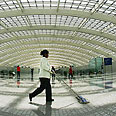
Kosher food 'dropped out' of Olympic Games preparations
Chinese Jewish Community faces severe shortage in kosher food due to temporary restrictions on imports ahead of Olympics; Toughened visa criteria delay expert rabbis from koshering local market food
China may be the queen of rice and tea, but are they kosher? The upcoming Olympic Games in Beijing are causing great problems for the giant republic’s Jewish community.
The games are delaying the food shipments at the ports, including kosher food, while tourists bringing in food products may have them confiscated as soon as they land in China.
These are special restrictions imposed by the government ahead of the Olympics, and are to be cancelled as soon as the games are over.
“There is severe shortage in kosher food due to the new restrictions. This shortage is expected to last at least until the games are over,” said Rabbi David Moskowitz, administrator of the SKS (Shatz Kosher Services), a kashrut organization importing kosher food to China.
According to Moskowitz, “Without a special import permit and proper inspections it is impossible to bring liquid foods into China on food supply flights.
"A person observing kashrut trying to bring in supplies in his personal belongings for his stay in China risks having his luggage inspected and his food confiscated – if they find it.”
Another problem making it hard for kosher food consumers is the serious sir pollution in China. In order to decrease the level of pollution before the Olympics – whether for PR purposes or in order to ensure a safe and enjoyable execution of the open-air portion of the games – restrictions have also been placed on importing raw materials in order to prevent the entrance of substances likely to cause air pollution.
Great difficulties
Even food packages and raw materials that do make their way into China are still facing trouble: Due to the great wave of preparations taking over the country, trucks are also hard to come by, not to mention their limited maneuvering ability as they are joined in the effort of keeping air pollution to a minimum – but leaving no means for food supply.“The Olympics have been causing great difficulties for us too. Even rabbis who handle kashrut and can make foods currently sold in markets kosher cannot get a visa to China due to Olympics-related security reasons, which have made the (visa) criteria tougher,” Rabbi Moskovitz said.
Rabbi Moskovitz now considers approaching the Chinese authorities through his attorney Mordechai Eizenberg, in request to ease the restrictions on importing kosher food.
As of now, the members of the Jewish community have to make do with food imported into China before the new restrictions took effect. The Jewish community in China consists of a few thousands mainly centered in Shanghai and Beijing.










